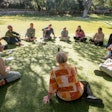More and more associations are opening to the public their events, trade shows and resources. As association membership declines across the industry, planners are rethinking their approach to keeping conference attendance up. Three case studies prove our point.
Case No. 1
For the first time in its 21-year history, Entertainment Software Association’s Electronic Entertainment Expo—nicknamed E3—opened part of its event to the public this year.
The annual video game industry trade show made this decision when one of its top exhibitors, Electronic Arts, announced it was holding its own competing event for the masses. Soon after, other competing expos began cropping up too. In June, E3 Live, held at L.A. Live, ran concurrently with the industry-only event a few blocks away at Los Angeles Convention Center.
It was a move that made sense for E3: Because the show highlights the latest in video games, nonindustry gamers have always had interest in the conference. While the move held off competitors momentarily, it makes us wonder: Will CES be open to the public next?
Case No. 2
During SXSW the last two years, IEEE’s meetings and conferences team booked the historic Driskill hotel in Austin, Texas, for an open-to-anyone soiree where the public could interact with IEEE members showcasing avant-garde technology.
This year, the event’s hashtag went viral, causing a line out the door of the party all night. Several high-profile drop-ins, including AOL founder Steve Case and Atari founder Nolan Bushnell, also showed up. The party featured games from STEAM Carnival and demonstrations from IEEE groups. No exclusive tickets to score here: “The event has been first come, first serve and introduces the association to the tech-savvy public, and its advancements to possible new members,” says Beth Surmont, CAE, CMP, senior manager of strategic programs at IEEE.
Case No. 3
American Society of Plant Biologists planted a radical new seed with the creation of Plantae, an online community site anyone in the plant science field can join—for free. Still in beta, the site facilitates discussions; gives access to white papers; and curates content on career advancement, continuing education and more to those not paying a membership fee to the association.
Jean Rosenberg, director of meetings and events for ASPB, says her team is discussing how to integrate the site into conferences. “It’s bigger than events, but also crucial to events because it does what it’s supposed to do—reach people before and after [the live conference],” says Rosenberg, noting that ASPB’s research and access to insider information serve as a draw for other industry people on the peripherals of the association.















